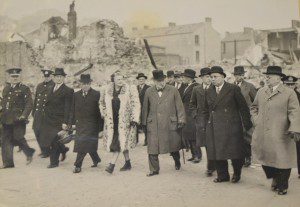On the 75th Anniversary of the Three Nights Blitz South Wales Police is remembering the role played by one of its predecessor forces, the Swansea Borough Police, in those terrible events.
The force had prepared well for the possibility of air raids in any coming conflict with officers having received training in dealing with them including the possibility of gas attacks.
War Reserve Constables and Special Constables were also recruited to supplement regular officers.

At that time the force was also responsible for the fire brigade in Swansea so it played a full part in that respect as well. The Auxiliary Fire Service, formed to support the regular brigade, also came under the control of the police.
The first loss of life of a Swansea policeman on duty during the war had occurred on the evening of 1st September 1940 during an air raid which resulted in considerable damage and a number of casualties. Amongst them was Constable 161 Jack Harold Jenks who was killed when he was struck by a splinter from a bomb which fell in the vicinity of Union Street and Park Street. He was 24 years of age and left a widow.
Swansea’s Police’s greatest challenge came with the heavy raids on 19th, 20th and 21st February 1941. They resulted in the deaths of more than 200 men, women and children. Several hundred more were injured. Thousand of premises, including in residential areas, were destroyed or damaged. The centre of the town was almost completely destroyed.
It was on the night of 21st February that another Swansea police officer died. Sergeant 37 William Bolton Flitter was carrying out his police duties at Orchard Street when a high explosive bomb fell nearby. He was killed and his colleague, Constable Stephen Jones, received very serious injuries. Sergeant Flitter was 43 years of age and left a widow.

During the Blitz police officers played their full part in rescue work and in dealing with those who had died. They also guarded premises which had been bombed to prevent looting and enforced restrictions on access to the devastated town centre where the ruins of so many buildings were dangerous and where hazards lurked from unexploded bombs.
The contribution made by Swansea’s police officers was recognised by the award of the British Empire Medal to Constable F.H. Dart for his part in rescuing people from bombed buildings, whilst four officers received King’s Commendations and six others received Chief Constable’s Commendations.
The Chief Constable of Swansea, Mr. Frank May, was a key figure both in preparing for air raids and in the response to the Three Nights Blitz working closely with other civil defence organisations. He was awarded the OBE for his work during the Three Nights Blitz. The citation for the award stated:
“Mr. May displayed great gallantry and fine leadership during the heavy air raids on Swansea. He was constantly in the main target area during the height of the attacks, inspiring the members of his Force and of the Fire and other Services by his courage and resource. His prompt action in dealing with the shelter arrangements undoubtedly saved thousands of lives.”
South Wales Chief Constable, Peter Vaughan, said “South Wales Police remembers the leadership of Mr May in such trying circumstances, the devotion to duty of all members of the Swansea Borough Police and especially Sergeant Flitter and Constable Jenks who gave their lives serving the people of Swansea.”

In an article published by the South Wales Evening Post the account given by Linda Jackson a resident of Gendros provides an insight into the emotional turmoil police officers and other emergency responders faced.
“I think my grandfather was stationed in Sketty as a PC,” she said. “I know he had to go around and see what was going on. He had to identify dead people, often only by the rings on their fingers. He never talked about it much. He had to look for identification after the bombs.”
But all this was against a background of personal tragedy.
“He lost his daughters, aged 15 and 17, to diphtheria within 10 days of each other,” said Mrs Jackson. “They were at Hill House Hospital. One of them died on February 20, I think, during the Blitz.”
She thinks he had some time off, but not much, and was soon back out on the streets of Swansea.
“He had to carry on with his work,” she said. “People like my grandfather were a big part of the war. The experiences they had every day. He was a strong man, but he broke down when he told my grandmother what he had seen. Everyone’s lives were traumatised and their home lives were affected.”

| [donate]
| Help keep news FREE for our readersSupporting your local community newspaper/online news outlet is crucial now more than ever. If you believe in independent journalism,then consider making a valuable contribution by making a one-time or monthly donation. We operate in rural areas where providing unbiased news can be challenging. |


















